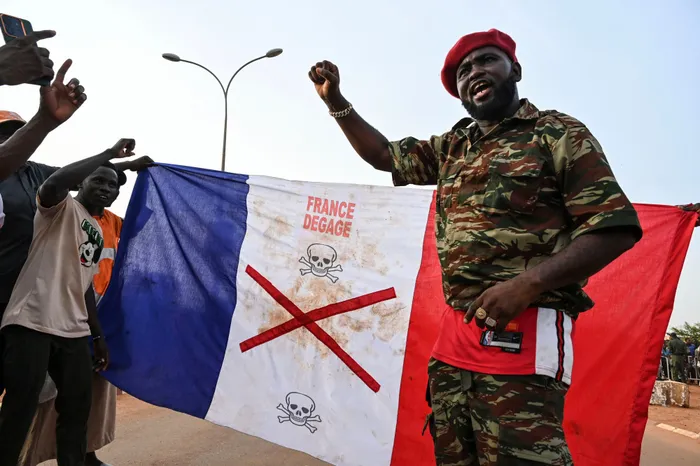‘Why Ecowas has not launched intervention in post-coup Niger’

Picture: AFP / Taken on September 1, 2023 – Supporters of Niger's National Council of Safeguard of the Homeland (CNSP) display a French national flag with a x-mark on during a protest outside Niger and French airbase in Niamey on September 1, 2023, to demand the departure of the French army from Niger.
By Maria Konokhova
Following the military coup in Niger that occurred in late July, President Mohamed Bazoum was overthrown and detained. Consequently, the Economic Community of West African States (Ecowas) suspended all co-operation with Niger and threatened military intervention if the rebels failed to restore Bazoum in power.
Although the regional bloc has not ruled out the military option to resolve the situation in Niger, the conditions on the ground have changed significantly since the July coup, providing for a diplomatic solution and inclusive dialogue, said Julius Maada Bio, President of Sierra Leone, in an interview with Al Jazeera.
The president recalled that following the coup, the Ecowas member states agreed to come up with a plan of military intervention “to reinstate the constitutionally elected government” that would be implemented as a last resort.
He noted that since then, Niger’s military authorities have begun to engage in dialogue with the international community. Therefore, the regional organisation is currently endeavouring to sustain this dialogue and not to intervene militarily.
“After that, a lot of dynamics have changed. The coup leaders [...] are beginning to accept dialogue. What we’re encouraging now is to take this dialogue forward, because military intervention, as you know, is not necessarily the best way to deal with a situation like Niger,” he said.
Commenting on the recent trend of military coups, particularly in West Africa, the leader noted that some coups can be considered “good”. In this regard, President Bio cited the example of his own country, which, like other West African nations, has experienced a number of military takeovers.
In January 1996, Bio led a military coup, ousting Captain Valentine Strasser. He served as Sierra Leone’s military head of state from January 16 to March 1996, as part of a military junta government called the National Provisional Ruling Council. As the military leader, Bio reinstated democratic rule in Sierra Leone by transferring power to Ahmad Tejan Kabbah of the Sierra Leone People’s Party after he won the 1996 presidential election.
Recalling the situation in the country at the time, he noted that there was a one-party state that “rejected all democratic principles”. For nearly 40 years, he continued, every democratic attempt to change the government failed because “there was mass corruption with impunity”. In addition, the government has waged a civil war at the “expense of people’s lives”. Against this backdrop, the people of Sierra Leone set out to change the situation and establish a democratic state.
“I’ve described mine, the one I took part in, that I’m fully knowledgeable about, as a good coup, because [...] I said, ‘We’ve come to reform, we have to conduct a democratic election and hand over power to the elected government,’” Bio stated.
Asked whether the coup that took place in Gabon on August 30 was a “good coup”, Bio could not give a precise answer, adding that he was not in a position to judge. The military staged a coup in Gabon, denying newly elected President Ali Bongo Ondimba a third term in office. In early September, Gabon’s newly appointed Prime Minister Ndong Sima told media that a two-year transition period before free elections promised by the country’s military rulers is a “reasonable objective”.
At the same time, Bio pointed to “bad governance” seen in some countries of the region, and its potential to incite conflict, exacerbate poverty and the suffering of people. According to the president, it is apparent that such a government cannot be considered truly democratic. Furthermore, he stressed, the support of authoritarian regimes by Western powers is a concerning trend that should not be overlooked.
“Democracy is the rule of people, and therefore they should enjoy from it,” the leader stressed.
In late July, the Niger military announced on national television that President Bazoum had been deposed, the borders closed, and a curfew imposed. The commander of the presidential guard, General Abdourahmane Tchiani, was appointed as the head of the National Council for the Defence of the Homeland, formed by the coup participants.
Following the coup, Ecowas activated a standby force and threatened intervention if the democratically elected president was not reinstated, and constitutional order was not restored.
Against this backdrop, other West African military-ruled countries, namely Mali and Burkina Faso, expressed solidarity with Niger’s military leadership, opposed the Ecowas invasion plan and pledged their support to the nation.
This article was first published on Sputnik